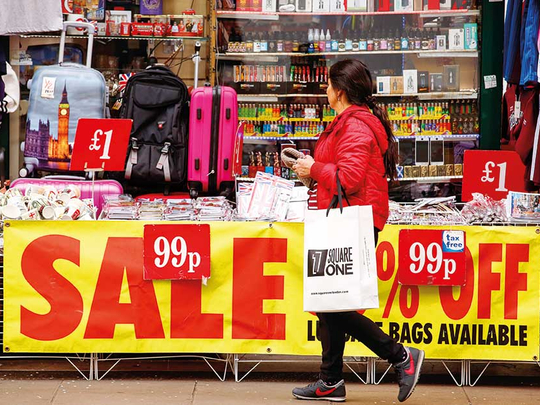
LONDON
UK consumer spending barely grew in the second quarter, business investment stagnated and trade added nothing to growth, leaving the economy struggling to keep up momentum.
The 0.1 per cent increase in household expenditure was the weakest since 2014 and is a further sign of how support from the consumers is waning. Gross domestic product expanded 0.3 per cent in the three-month period, unrevised from an initial estimate and leaving growth in the first half at its worst since 2012. It’s also the slowest among Group of Seven nations that have reported so far.
The data reinforce the view the economy has moved into a slower growth phase, at a pace well below its average in recent years. The change is partly related to the pound’s drop since the Brexit vote, which has pushed up inflation, while confidence has flagged amid a lack of clarity on the type of deal the UK will agree with the European Union.
The Confederation of British Industry said Thursday that retail sales fell the most in more than a year this month, which tallies with Bank of England Governor Mark Carney’s view that consumers are in the “teeth” of a squeeze on their pockets. Spending could improve this quarter, however, as the March-June figures were skewed by a tax-driven drop in car sales.
Brexit is also having an impact on investment decisions, and reports indicate that some firms have become reluctant to commit to major projects. In the three months through June, investment stagnated compared with both the first quarter and a year earlier.
Many UK companies have also warned that decision to leave the EU may cut them off from a vital supply of labour. New data on Thursday showed net migration fell to a three-year low in the 12 months through March because of an exodus of European workers. The rights of EU citizens in the UK post-Brexit, and those of Britons living in other EU countries, have yet to be resolved more than a year after the referendum.
The GDP report showed that exports and imports both rose 0.7 per cent in the second quarter, as did government spending. One positive was a pickup in services — the largest part of the economy — which ended the quarter with the fastest growth in 10 months.
“This data confirms the picture of a moderation in UK growth that we expect to continue through the second half of the year,” said John Hawksworth, chief economist at PwC. “But we don’t think this slowdown should turn into a recession.”
Brexit talks are due to resume next week, and the UK government has published a series of papers in the past two weeks to demonstrate it’s making progress. But continued uncertainty about the outcome among consumers and businesses could further damage UK growth prospects. Carney said this month that the fortunes of the economy depend heavily on how Brexit proceeds.
While the dire economic predictions made before the referendum haven’t come to pass, the economy has, in the words of the statistics office, “slowed markedly.” Economists surveyed by Bloomberg see expansion cooling to 1.5 per cent this year and 1.3 per cent in 2018, down from 1.8 per cent in 2016.
“We expect the economy to continue to struggle,” said Samuel Tombs, an economist at Pantheon Macroeconomics in London. “Meanwhile, we expect Brexit risk to increasingly bear down on business investment as the U.K.’s exit date draws nearer.”












